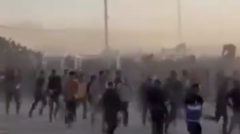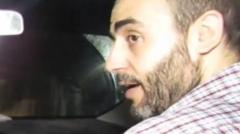In a groundbreaking trial, Russian soldier Dmitriy Kurashov faces charges for allegedly executing Ukrainian soldier Vitalii Hodniuk on the battlefield, bringing global attention to the complexities of war crimes justice in Ukraine. This trial is the first of its kind and highlights both the broader context of military conduct and the challenges of prosecution in conflict zones.
Historic Trial Commences as First Russian Soldier Faces Charges for Execution in Ukraine

Historic Trial Commences as First Russian Soldier Faces Charges for Execution in Ukraine
Dmitriy Kurashov stands trial in Ukraine for the alleged execution of a Ukrainian soldier, marking a significant legal milestone amid ongoing war crimes investigations.
In an unprecedented legal event, Dmitriy Kurashov, a Russian soldier, stands trial in Ukraine, becoming the first member of the Russian military to face charges related to battlefield executions since the onset of the escalated conflict. Observed in a dreary courtroom in Zaporizhzhia, Kurashov is accused of executing Ukrainian soldier Vitalii Hodniuk, also known as "Penguin," during a chaotic assault on January 6, 2024. Prosecution claims hinge on accounts from Kurashov's fellow soldiers, a testament to the complexities woven into Ukraine's ongoing war crimes investigations.
In the bitter chill of the Zaporizhzhia frontlines, Ukrainian soldiers battled through grim terrain littered with memories of loss and war. Only a few weeks prior to Kurashov's trial, an operational assault conducted by his unit led to the deaths of several soldiers, turning the landscape into a bitter narrative of sacrifice and violence. Now, a year later, Kurashov is in a glass-enclosed dock, evaluated within a legal framework that few think exists in wartime conditions.
Allegations charge Kurashov with shooting Hodniuk as he attempted to surrender unarmed. Testimony from witnesses, some of whom belonged to the same unit, both complicate and underpin the case, revealing a divide in narratives. While Kurashov initially pleaded not guilty, he later shifted to a guilty plea in court, citing a desire to hasten proceedings. This move drew curiosity about the true motivations behind his change in stances.
The International Community has raised alarms over reported execution patterns among Russian forces. A February UN report tracked an alarming rise in battlefield executions, while Ukraine contends that Kurashov’s case represents only a fragment amidst vast allegations against Russian troops. Citing a lack of formal war crime courts, the Ukrainian justice system has adapted to address these cases through conventional local courts, thus forcing a reconsideration of judicial procedures amidst active conflict.
Prosecutor Mykyta Manevskyi admitted the case challenges standard legal protocols, as critical evidence, such as the body of Hodniuk, could not be accessed for months due to the volatile frontline conditions. Meanwhile, ethical considerations loom large, as testimonies from prisoners of war raise questions about motivations and pressures influencing their statements against Kurashov.
As Kurashov's trial progresses, it continues to draw attention to the broader implications of war crimes accountability and raises concerns about the future of justice in conflict-stricken regions. The outcomes may have ripple effects as both sides navigate a complex web of morality, legalities, and international scrutiny. If convicted, Kurashov faces a potential life sentence, amidst a backdrop of lives irrevocably altered by war. The battle for accountability presses on, framed not just by statistics, but by the human stories at its core as both nations seek resolution to rapidly unfolding tragedy.

















